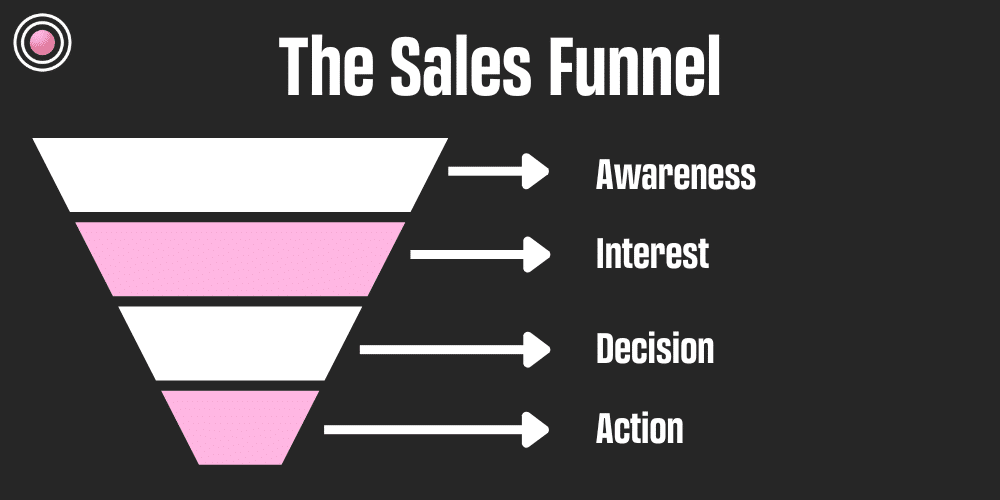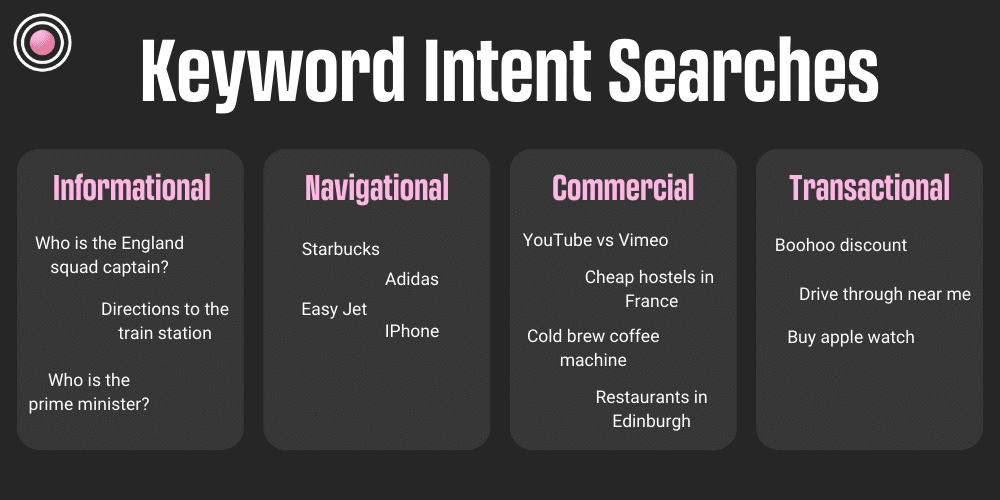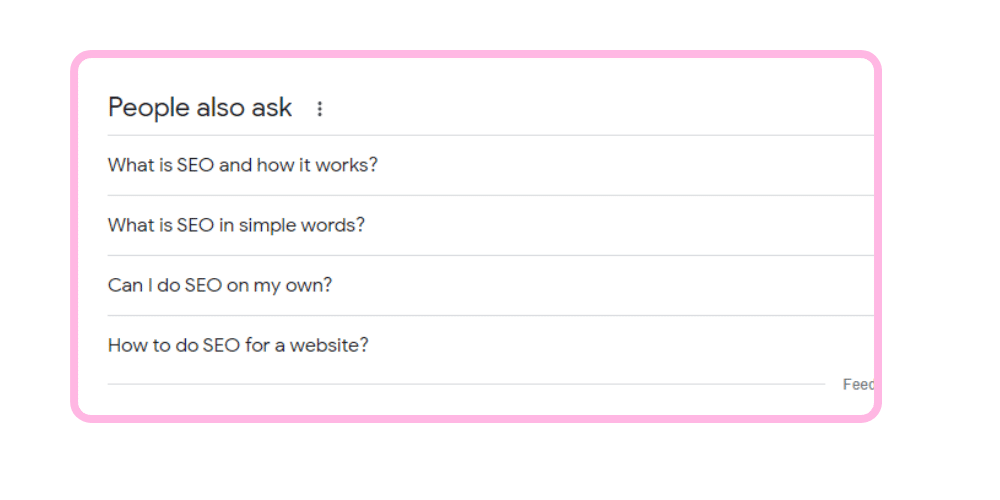
-
Cora Dixon
- 8 Min Read
- Blog, PPC, SEO
How PPC and SEO Work Together
To fully understand how PPC and SEO work together and impact your business, it’s vital to understand both terms and how to use them. Both entirely through organic and paid search.
PPC
PPC or pay-per-click advertising is a form of search engine marketing. Advertisers pay a fee to a search engine each time a user clicks on their link. PPC advertising allows your site to soar to the top of the SERP.
Now don’t worry, beginning your PPC journey is simple:
First: Define your goals – setting your PPC goals allows you to determine your business’s platforms and ad preferences.
Second: Target your audience based on keyword intent. The ads you display and the landing pages you send your visitor to must align with your visitors’ position in the sales funnel.
There are three main categories of search intent keywords:
- Informational intent: the searcher is looking for information. These could be answers to questions, but not all of these searches are questions.
- Commercial intent: commercial intent is when a user has the strong intent to perform an act online. This could vary between purchasing products, subscribing to or joining a group or service, and acquiring a service.
- Transactional intent: Transactional intent hovers between both informational and commercial. This is someone who is confident they want to make a purchase. They are likely aware of what product they want or need but are searching for where they can make the purchase.
- Navigational intent: This is where a user has the intent to find a specific site. These users are confident in what they are searching for and know what they want They could be searching for specific brand names, specific products, or specific technology that interests them.
Here are some examples of intent keywords search terms:
Third: Build your landing pages – the landing page is a purpose-built page visitors are taken to after engaging with a PPC ad. A landing page’s sole purpose is to persuade online visitors to convert, this could be a form submission, an e-newsletter sign-up, or an online purchase. It all depends on the predefined goals.
It is vital to ensure that your landing pages are relevant to persuade users to remain on the webpage. Some good tools to consider are Hubspot, Leadpages, Instapage, and Clickfunnels.
Fourth: Get creative and make your ads – your ads serve as a link between the search intent of the user and the landing page. A landing page is a web page a user lands on after interacting with your ad.
The PPC ads you create are presenting the value of your business or service to a consumer. This should be in a way that interests and shows your products or services and USP (unique selling point) is an asset to them. Hopefully leading them to click and hopefully explore your landing page or site. Make them interesting, and eye-catching, no one wants a boring, flat PPC ad.
Fifth: analyze and optimize the PPC strategy: with all campaigns and methods, it is essential to evaluate the success of your PPC ads. Consider elements such as; click-through rate, conversion rate, cost per click (CPC), and return on ad spend.
Our blog ‘What are the benefits of PPC?‘ highlight all of the benefits in PPC alone and how you can power up your online presence.
SEO
SEO or search engine optimisation is a digital marketing technique that optimises your website to improve your visibility on search engines like Google with the end goal of ranking highly on search engine results pages. Ranking higher on search engines leads to increased business authenticity which we all want right?
There are a variety of things you can do to positively impact your business’s SEO efforts positively and rank highly on search engine results pages, including:
- Perform keyword research and use the KEYWORD data to implement keywords: keyword research is the process of analyzing the terms that people are using to search online. The goal is to use the data to edit and enhance your own SEO or general marketing to present yourself to searches front and centre.
Keyword research allows you to fully understand what search terms are already being used by your target audience. This then allows you to form your content strategy and ideas around these topics or search terms to ensure you are providing the content, services, and answers that are being searched for, and using them makes it possible for users to find your webpages via organic search results.
Providing people with content that is in their demand and answering questions they’re asking will bring your audience to YOU rather than attempting to push content onto them.
- Establish positive backlinks: backlinks or inbound links, incoming links or one-way links are links to a webpage from another website or source. Backlinks are essentially votes of confidence from other websites which back your content as valuable and credible, the more votes of confidence your website has the more credible Google sees you to be. Google heavily associates backlinks with votes of confidence and therefore presents you higher to search engine users. Pages with a hefty amount of backlinks regularly have a high number of organic traffic.
However, not all backlinks are treated as equal and must fall under some key values. They must come from trusted and authoritative sites I mean, would you rather have backlinks from SEJournal or your random neighbour’s new website? Google also likes to see your content being vouched by multiple different sites.
If a website backlinks to your content again….and again….and again it may become less impactful but, various other credible websites voting your content as valuable and important shows your website and content are making an effective impact on people.
- Refresh your content with ‘people also ask’: SERPs don’t only provide a top list of blue links for visitors to find they also include a ‘people also ask section.’
Capitalise on this by answering these in the content on your site to expand your content and provide more on what relevant topics people are searching for. Using relevant keywords to answer questions that people are searching for now expands your variation of content and allows you to be discovered through these pieces. This technique also presents you with an opportunity to appear more than once on SERPs.
- Optimise your site for speed and mobile use: The speed at which your site loads has a massive impact on your visitor’s experience and notably 53% of users leave a webpage if it takes too long to load. There are various things you can do to improve your website’s speed including improving your website’s software and configuration which in turn minimizes your servers’ response time.
You can also minimize the number of redirects as these have a particularly negative effect on loading speed, especially for users on mobile who are most likely to be using a much less reliable internet connection than desktop users.
Mobile optimisation and mobile web speed is going to become an important ranking factor in SEO. Google plans to base rankings of both desktop and mobile sites on the speed at which your mobile page loads, leading to non-mobile-friendly sites performing lowly on search engine rankings. To ensure your site is mobile friendly you can choose a reliable web host, potentially create an app, or enable accelerated mobile pages (AMP) that’s just a few suggestions.
The difference between PPC and SEO is simple; organic ranking vs. paid traffic
There are a few stand-out differences between PPC and SEO and the first is the fact that paid ads will always appear above organic SEO-related search results and at the top of the page. Secondly is that traffic from organic listings in relation to SEO is free and PPC has a cost per click (CPC).
There are pros and cons to using both:
SEO
Pros:
- Improves your organic traffic and boosts your visibility organically in search engines for your specified keywords putting your business on the stage for potential customers. This drives the brand awareness of the business.
- CPC, SEO is free to an extent, although your development will require various resources and effort, the cost per click through on a link ranked from SEO alone is completely free.
- Appearing high up in the rankings on SERP is not going to happen in one click but appearing in these rankings and establishing yourself strategically is a result that money simply can’t buy.
Cons:
- SEO can take some time to get the ball rolling with search engines being dominated by well-established businesses you may feel a bit like the ugly duckling trying to insert yourself into the field.
- SEO does not guarantee results, you could spend days working on content updates and the features on your site but a jump up the rankings isn’t guaranteed.
PPC
Pros:
- Targeting is incredibly effective. PPC ads can target keywords at a certain time of day, day of the week location, language, and devices or audiences based on their previous searches or online visits.
- PPC Adwords offer slightly more stability than SEO due to the lack of changes affecting them. There are changes here and there however, they tend to have a lower impact and are easier to manage using analysis of search term reports.
- PPC is not free but this can provide huge benefits as it allows for tight control of the budget as you can set a firm limit on the costs you’re willing to spend on PPC. It would be beneficial to have some idea of ROI (return on investment) when you do this.
Cons:
- Clicks on your ads and in turn visits to your landing pages don’t always result in profit. You can convince hundreds of people to click but the challenge then is persuading them to take action and convert to your site.
- The journey of PPC ads can require a lot of skill and knowledge to set up effective result-driving campaigns which are why many businesses choose to use an agency that specialises in these types of things (like us at ROAR😜).
How PPC and SEO work together
As established, SEO increases a website’s visibility on search engine results pages. Alternatively, a PPC campaign seeks to increase traffic through curated and targeted ads via search engines, social media, or other online spaces.
SEO and PPC strategies can work together in many ways;
Elevate SERP results: PPC aids in maximizing SERP results. When running a paid advertisement, your website will appear at the top. With an effective SEO strategy projecting your site organically onto the first page of search engines, there’s potential to take over a nice chunk of the results page. With a PPC ad at the top and organic results appearing just below your business is bound to catch someone’s eye.
PPC insights can support SEO campaigns: When pursuing new keywords some time can pass before you see any results but if the CTR (click-through rate) and engagement are low – even if it ranks on the first page of a search engine you reach a roadblock. PPC would be different, you’ll know whether a PPC ad campaign is working very quickly even with little investment.
You could consider using PPC to do some additional research to fuel your SEO strategy. You can test a variety of ad copy including; headlines, titles and description copy, keywords and topics, and landing page designs, for example, to gather data like bounce rate, time spent on a page, conversions, and other metrics to enhance your SEO strategy.
Bring users back to your site: If your site is performing well with the SEO efforts you are most likely pulling in a good number of visitors. However, most of these visitors do not make a purchase or take action this can take a few website visits. PPC and SEO can work together to bring users back to your site at a later date.
Say for example you offer carpet relaying and a customer needs to look at a variety of textured or colours a PPC ad will show up later reminding users of the products they might want to view again.
Now you know how PPC and SEO work together, why not start your digital marketing journey with ROAR! We offer a variety of SEO and PPC management services to elevate your business. To begin your journey why not get in touch and set up a free consultation with one of our team.










